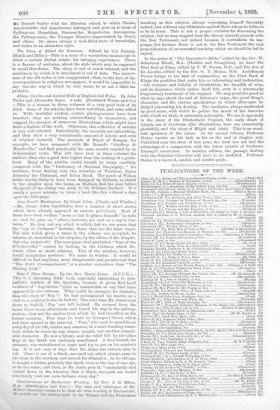teaching on this subject, always expressing himself fervently indeed, but
without any bitterness against those whom he believes to be in error. This is not a proper occasion for discussing the subject; but we may suggest that the theory scarcely accords with the New Testament, not indeed because it contradicts its lan- guage, but because there is not in the New Testament the vast preponderance of sacramental teaching which we should be led to expect.
In the series of " The Expositor's Bible," edited by the Rev. W. Robertson Nicoll, M.A. (Hodder and Stoughton), we have The First Book of Kings, edited by F. W. Farrar, D.D., and The Acts of the Apostles, edited by the Rev. G. T. Stokes, D.D. Archdeacon Farrar brings to his task of commenting on the First Book of Kings the qualities that make him so interesting and instructive, —his richness and felicity of illustration, his breadth of view, and an eloquence which makes itself felt, even in a necessarily fragmentary treatment of his original. We may point for proof to what he says about the end of Solomon's reign, the great King's character, and the curious speculations in which after-ages in- dulged concerning his destiny. The readiness, always moderated by good sense, with which he points the moral of the histories with which he deals, is eminently noticeable. We see it especially in the story of the Disobedient Prophet, the early death of Abijah, son of Jeroboam (the illustrations here are remarkably plentiful), and the story of Elijah and Ahab. This is an excel- lent specimen of the series. In his second volume, Professor Stokes carries on his task as far as the end of chapter xxii. Published near the close of last year, the book has not had the advantage of a comparison with the latest results of Professor Ramsay's researches. In another edition, the passage dealing with the Galati= Churches will have to be modified. Professor Stokes is a learned, candid, and careful guide.




















































 Previous page
Previous page